Bye Bye Birdie
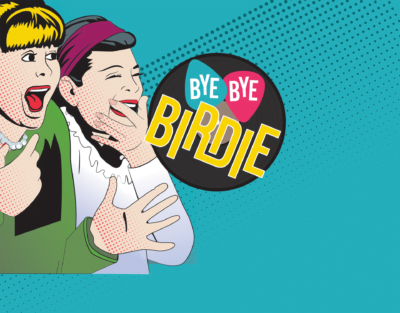 Book by Michael Stewart
Book by Michael Stewart
Music by Charles Strouse
Lyrics Lee Adams
Directed and Choreographed by Tammy Mader
Musical Direction by Alan Bukowiecki
Produced by Drury Lane Theatre, Oakbrook Terrace
A Birdie That’s in on the Joke
If you want to see an amusing, light-hearted send-up of 50s teen culture with superb production values and great dancing, Drury Lane’s Bye Bye Birdie is the show for you. Written in 1960, this Broadway musical may have been one of the earliest satires of 1950s middle-class society. As such, its bite is like a lighter version of the 1998 movie Pleasantville, and the show comes down more on the side of fantasy than social critique. However, director/choreographer Tammy Mader’s cartoony concept, complete with a projection-heavy scenic design by Christopher Ash, and Charles Strouse’s period-appropriate score, make an enjoyable entertainment.
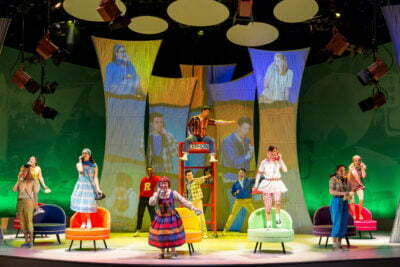
It’s 1959, and the record producing company owned by Albert Peterson (Matt Crowle) and his mother, Mrs. Mae Peterson (Catherine Smitko) is in deep trouble. They’re deep in debt, and their sole major contract, teen heart-throb Conrad Birdie (Jason Michael Evans), has just been drafted into the army. Fortunately, Albert has an assistant, Rose Alvarez (Michelle Aravena), who loves him and does his job for him, and she suggests holding one last spectacular event on the Ed Sullivan show to send Birdie off. That way, they can popularize a single, “One Last Kiss,” enough for them to be able to dissolve the company with dignity. Rose’s idea is for Conrad to kiss a lucky teenage girl good-bye, and she randomly selects Kim MacAfee (Leryn Turlington), a member of the Conrad Birdie fanclub in the small town of Sweet Apple, Ohio.
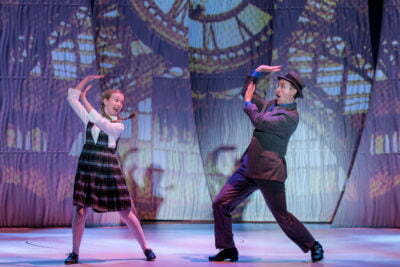
It just so happens that at that moment, Kim had decided she is in the process of getting over Conrad. She had recently started dating a classmate, Hugo Peabody (Ryan Stajmiger), and thinking of herself as a grown-up. The chance to kiss Conrad Birdie on live national TV put an immediate hold on those plans, but Hugo is jealous and embarrassed. Once they arrive in Sweet Apple, Rose begins to feel rather foolish about her crush, as well. Albert’s mother is appalling racist even by 50s standards, and Albert demonstrates no ability to stand up to her or act independently whatsoever. Rose had hoped that once they quit the record business, which they fell into accidently anyway, they might build the lives they actually wanted, but that’s looking unlikely and undesirable. So she and Hugo plot to sabotage the big event, and end their relationships on their own terms. But, this being a musical, happy reconciliations and the learning of important lessons are inevitable.
Michelle Aravena quickly won over Chicago last year with her performance in Drury Lane’s West Side Story, and she returns as a worthy star. Not only does she have a powerful voice for songs like “Spanish Rose” and “What Did I Ever See in Him,” but she’s also hilarious. Mader’s vaudeville-style choreography of the scene in which Rose seduces an entire chapter of Shriners is the highlight of the show, but Matt Crowle holds his own during the famous tap number “Put on a Happy Face.” However, his character suffers because Mrs. Peterson, who is a Jewish mother stereotype in all but name, is so vile towards Hispanics that his cowardice correspondingly looks much more extreme. Other especially strong performances include that of George Andrew Wolff, who plays Kim’s father like a (nominally) grown-up version of Ralphie from A Christmas Story.
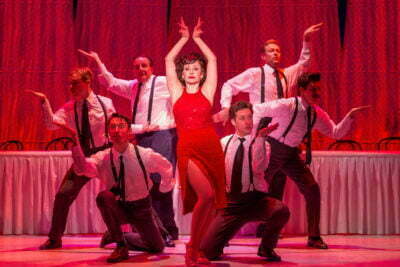
Mader’s concept makes television and the town’s relationship with it the focus of the production. There’s plenty of justification for this in the script; the characters’ “Hymn for a Sunday Evening” is a literal hymn to Ed Sullivan. Ash’s scenic design makes use of two revolves, one inset in the other, allowing actors and properties to enter and exit seamlessly. The most striking choice Mader’s made in terms of characters is that while Conrad Birdie is clearly meant to be Elvis, in Mader’s version, he seems more like a manufactured, disposable pop star. Jason Michael Evans’s performance telegraphs sleaziness even before Ash sarcastically projects an American flag over the entire stage during Conrad’s song “Honestly Sincere.” Maybe that’s why Conrad’s song with the teenagers, “A Lot of Livin’ To Do” doesn’t quite have a big enough impact, despite being visually impressive as one of the biggest dance numbers. But even Michael Stewart’s book stops pretending before it’s through that anyone cares about whether Kim and Hugo get back together. The bigger issue is whether they are actually mature enough to get over Birdie.
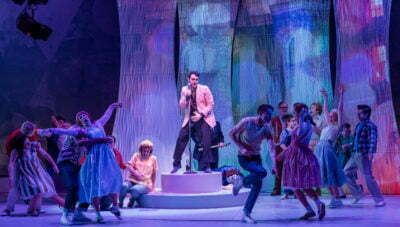
Trying to balance the show’s mild satire of 50s social standards with satirizing the music that was crucial to breaking those standards is a difficult trick. Kim’s song “How Lovely to be a Woman,” in which she proclaims her mature appreciation for catcallers while covering herself in a baggy sweater, is the most effective example of the former, while her scenes with Conrad do a good job of the latter. A full deconstruction of Eisenhower suburbia isn’t necessary; Elvis has been dead for nearly forty nears, and it’s difficult to imagine the 50s presented in any way other than Pleasantville. Mader’s decisions indicate that she is more than savvy enough to pick up on and communicate the subversive elements already present in Bye Bye Birdie. With that done, the audience can comfortably enjoy Strouse’s classic Broadway-infused-with-early-rock score, under the fine conducting of Ben Johnson. The staging at Drury Lane is beautiful, the cast is filled with energetic singers and dancers, and the entire show is a colorful delight.
Highly Recommended
Jacob Davis
[email protected]
Reviewed January 21, 2016
This show has been Jeff recommended.
For more information, see Bye Bye Birdie’s page on Theatre in Chicago.
Playing at 100 Drury Lane, Oakbrook Terrace, Illinois.
